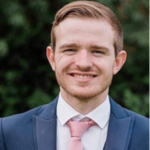Blog
My journey from research assistant to the World Bank and Yale
How SA-TIED transformed my career
When I began my role as a research assistant for the SA-TIED programme in January 2020, I didn’t know that it would lead me to such prestigious institutions like Yale University and the World Bank. The programme has been instrumental in shaping my career and providing me with opportunities to realize my full potential.
Throughout my time at SA-TIED, I was exposed to experiences that enhanced my understanding of research. I learned that research is not a linear process, but a dynamic journey filled with complexities and challenges. This newfound perspective instilled in me the resilience and determination required to successfully navigate the intricacies of research. Moreover, SA-TIED provided an empowering environment that allowed me to develop proficiency in coding languages, a skillset that would prove indispensable in my future endeavours.
Among the specific assignments at SA-TIED that profoundly impacted my career trajectory was my involvement in day-to-day data work as a research assistant. Engaging with extensive tax data and receiving capacity building opportunities provided me with a competitive edge and valuable skills in data analysis, quantitative research, statistical software utilization, data management, and familiarity with various research methodologies. These experiences have been meaningful in shaping my capabilities to actively contribute to economic analysis and research projects.
The programme offers a good introduction into the nature of economic research. Research can be difficult and frustrating, which is important to realize sooner rather than later. Young researchers can particularly struggle with setbacks in the research process. It sounds cliché, but to have a productive research career, you need to be ok with ‘failure’. The complexity of the data at the National Treasury provides a great introduction to this component of research. The programme's supportive and nurturing environment for emerging researchers like me cannot be overstated. Through the mentorship and training provided by SA-TIED, I developed the resilience to view challenges as opportunities for growth rather than insurmountable obstacles.
Diverse research collaborations and projects
As a research assistant, I was also involved in various stimulating projects that allowed me to delve into multiple aspects of economic research. I started off working with Prof Isaac Marcelin studying the effects of South Africa’s Employment Tax Incentive on firm profitability and growth. In a second project with Prof Isaac Marcelin, we studied the effects of informal lending practices between firms on employment and profitability. With Friedrich Kreuser, a former South African National Treasury secure data lab research assistant, we estimated firm-level capital stock and productivity in the South African manufacturing sector.
I am currently working with professor’s Kevin Donovan, Jim Levinsohn, Murray Leibbrandt, and Krisztina Orbán to quantify the effects of plant closures on worker-level outcomes such as employment and income. It’s been an absolute honour to learn from so many great economists all of which would not have been possible without SA-TIED.
Building connections
The benefits of the programme extend beyond collaborations and capacity building. The connections I forged through SA-TIED played a pivotal role in opening doors to life-changing opportunities. Meeting Isaac Marcelin through Charl van Schoor, a former SA-TIED research assistant, introduced me to a vibrant community of like-minded researchers. These connections expanded my professional network and paved the way for future collaborations, significantly influencing my career trajectory. Through these connections, the World Bank noticed a research paper I co-authored with Marcelin, ultimately leading to an invitation to join the bank as a consultant. Simultaneously, my work with Krisztina Orbán led to connections at Yale University, which initiated our collaboration on labour market flows in South Africa. My journey is a testament to the value of programmes like SA-TIED, which strongly emphasize capacity building, mentorship, and networking. SA-TIED equipped me with crucial skills and connected me with people and opportunities that may have remained beyond my reach.
The programme’s ability to provide technical skills and foster community and collaboration among its participants sets it apart. By creating an environment that encourages the free exchange of ideas, collaborative work on impactful projects, and continuous learning from one another, SA-TIED nurtures future leaders' growth in economics. As my journey continues, I am eager to apply for my PhD in a few months, intending to start in August 2024. SA-TIED set the wheels in motion, propelling me toward a future filled with academic excellence and significant contributions to economic research.
Dane Brink is a Pre-Doctoral Fellow working on unemployment in South Africa with Professors Krisztina Orbán (Monash), Kevin Donovan (Yale), and Jim Levinsohn (Yale). He holds an M.A. in Econometrics from the University of Pretoria. Dane worked on several research projects using South African tax administrative data and helped create a matched employer-employee database. His research interests include causal inference and labour economics.
The views expressed in this piece are those of the author(s), and do not necessarily reflect the views of the Institute or the United Nations University, nor the programme/project donors.
 Join the network
Join the network

